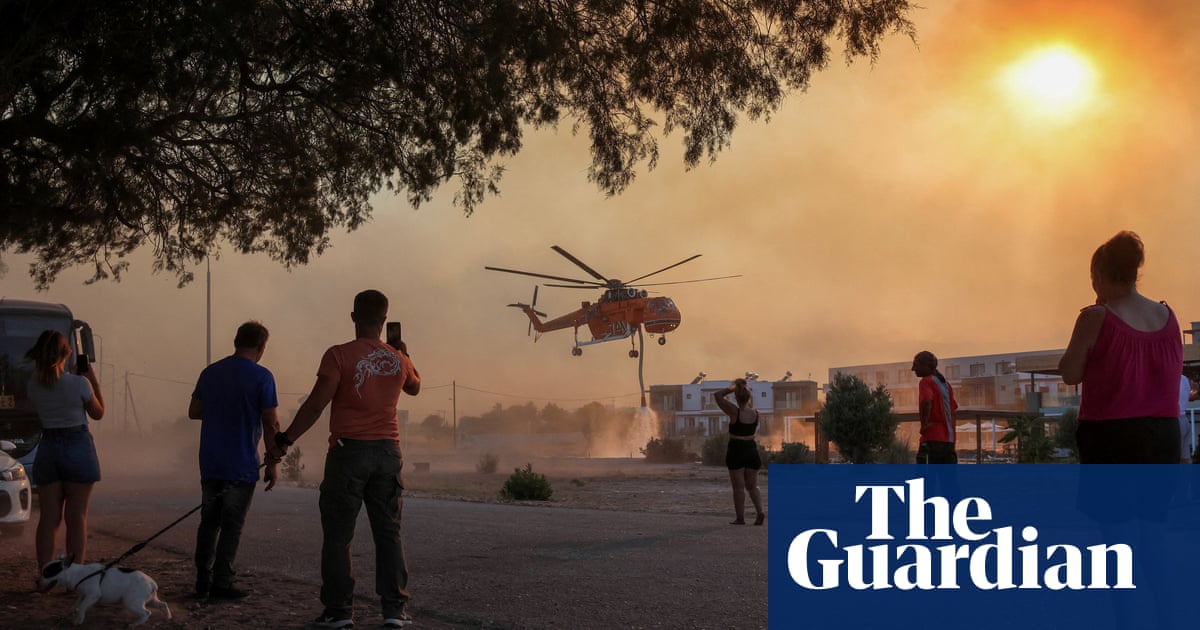
Wildfires were burning in at least nine countries across the Mediterranean on Tuesday as blazes spread in Croatia, Italy and Portugal, with thousands of firefighters in Europe and north Africa working to contain flames stoked by high temperatures, dry conditions and strong winds.
At least 34 people were killed in Algeria, where 8,000 firefighters on Tuesday battled blazes across the tinder-dry north. Fires burned in a total of 15 provinces, leading to the evacuation of more than 1,500 people from their properties.
Witnesses described fleeing walls of flames that raged “like a blowtorch”, destroying homes and coastal resorts and turning vast forest areas into blackened wastelands.
The Algerian online news site TSA quoted the National Meteorological Office as saying temperatures had reached 50C (122F) in some regions.
Among those killed this week were 10 soldiers trapped by flames at Beni Ksila, in Bejaia province, according to the defence ministry. The official APS news agency reported on Monday night that 34 people had died across several regions.
Local media reflected anger about the latest deadly fires. The TSA news site asked: “In view of all these measures, why couldn’t we avoid the disaster?”
Fanned by strong winds, fires forced the closure of two border crossings with neighbouring Tunisia, where blazes have been especially fierce in the north-western Tabarka region.
More than 300 people were evacuated from the coastal village of Melloula by boat and overland and firefighters were still battling blazes on Tuesday in three areas in the north-west: Bizerte, Siliana and Beja. Firefighters struggled to extinguish flames destroying forests and citrus and hazelnut groves.
The official TAP news agency reported one death, that of a school principal who died of asphyxiation from a fire in Nafza, in the north-west.
Wildfires also broke out in the woodlands of Latakia, a governorate on the Mediterranean in north-western Syria, and helicopters are being used to extinguish fires.
“Firefighting teams are working to put out the massive wildfires that have broken out in the woods of Latakia northern countryside which are still uncontrolled until now,” the North Press Agency reported firefighters as saying on Tuesday.
Italy has been hit by violent storms and wildfires. At least seven people were killed on Tuesday after storms in the north and wildfires in Sicily.
Among those killed was a 16-year-old girl. The prime minister, Giorgia Meloni, said the girl died when a tree fell on her tent during a scout camp near Brescia after high winds and torrential rain overnight.
Milan residents reported torrential rain and hail on Tuesday morning, which flooded streets and uprooted trees, some of which fell on to parked cars.
While the north was drenched, the heatwave across the south persisted, with temperatures of 47.6C (117F) recorded in the eastern Sicilian city of Catania on Monday. The bodies of two people in their 70s were found in a house destroyed by the flames, while an 88-year-old woman was found near the Sicilian city of Palermo, according to media reports.
Sicily’s regional president, Renato Schifani, said he planned to ask the government to declare a state of emergency for the island. A decision was expected to be made at Wednesday’s ministers’ meeting in Rome.
The civil protection minister. Nello Musumeci, wrote on Facebook: “We are experiencing in Italy one of the most complicated days in recent decades – rainstorms, tornadoes and giant hail in the north, and scorching heat and devastating fires in the centre and south. The climate upheaval that has hit our country demands of us all … a change of attitude.”
Italian firefighters said they tackled nearly 1,400 fires between Sunday and Tuesday, including 650 in Sicily and 390 in Calabria, the southern mainland region where a bedridden 98-year-old man was killed as fire consumed his home.
Meanwhile, prosecutors in Palermo launched an investigation into the wildfires that have hit the Sicilian capital. According to investigators, dozens of fires could have been set deliberately by people, with hot winds and dry conditions fuelling the blazes.
For years, the Sicilian mafia has been suspected of being involved in the wildfires, pushed by the lucrative reforestation contracts, although that link has not been proved in this week’s fires.
On Wednesday, authorities in Calabria released a video of an arson suspect caught on camera by a drone. The Governor of Calabria said the man was reported to the police.
Greece has also been particularly hard hit this summer, with authorities evacuating more than 20,000 people in recent days from homes and resorts in the south of the holiday island of Rhodes.
Close to 3,000 tourists had returned home by plane as of Tuesday, according to figures from the transport ministry, and tour operators have cancelled upcoming trips.
Two firefighting pilots died when their plane, which had been dropping water, crashed on a hillside close to the town of Karystos on the island of Evia, east of Athens.
The Greek prime minister, Kyriakos Mitsotakis, said: “I will state the obvious: in the face of what the entire planet is facing, especially the Mediterranean which is a climate change hotspot, there is no magical defence mechanism, if there was we would have implemented it.”
The body of a 41-year-old farmer, missing since Sunday, was also found in a shack in a remote area.
New evacuations were ordered overnight on the islands of Corfu, Evia and Rhodes, where thousands of tourists were moved to safety over the weekend.
In France, nearly 100 firefighters were trying to contain a wildfire in the municipalities of Cagnes-sur-Mer and Villeneuve-Loubet, close to Nice international airport, officials said on Tuesday.
The Bouches-du-Rhone department on Tuesday was placed under a “red alert”, with authorities seeing a “very high risk” of wildfires. More than 300 firefighters were battling to contain fires near the city of Arles, police said.
In Croatia, winds were so strong that firefighting aircraft could not take off, local media reported. Firefighters battled wildfires that were spreading just south of the Adriatic city of Dubrovnik, a tourism destination, late on Tuesday.
“It’s been a long night but we managed to stave off the part (of the fire) that is important because of the houses,” firefighting unit commander Stjepan Simovic told the Associated Press. “We must be careful because the wind has started to pick up and the fire can grow again.”
Winds brought disaster to neighbouring Montenegro, where two people drowned and several were injured when strong southern winds hit the coast, port authorities in the towns of Ulcinj and Petrovac said.
A rapidly spreading wildfire at the centre of Spain’s island of Gran Canaria on Tuesday prompted authorities to remove several hundred villagers, shut three roads and deploy firefighting helicopters.
Antonio Morales, head of the Island Council of Gran Canaria, said about 100 firefighters and nine aircraft were working to put out the blaze that had so far burned through 200 hectares of forest.
In Portugal, usually one of the European countries worst hit by wildfires, according to EU data, hundreds of firefighters scrambled on Tuesday to put out flames near the popular holiday destination of Cascais, with strong winds complicating efforts.
The wildfire started in a mountainous area of the Sintra-Cascais park, which covers about 56 sq miles (145 sq km) west of Lisbon. More than 600 firefighters were brought in and water-bombing planes also battled the blaze but had to stop operating as the night set in.
The mayor of Cascais, Carlos Carreiras, said gusts of up to 37mph were the biggest challenge and that some people had been evacuated as a precaution.
Portugal is under a widespread drought affecting 90% of the country.
In Turkey, a hospital and a dozen homes were evacuated as a precaution in the coastal town of Kemer, where firefighters for a third day battled a blaze raging through a woodland. At least 10 planes, 22 helicopters and hundreds of firefighters were deployed to extinguish the fire as meteorologists warned temperatures could rise several degrees above seasonal averages.
On Wednesday, the EU commissioner for crisis management, Janez Lenarčič said Brussels wanted to sign contracts this year for up to 12 firefighting planes to improve its ability to fight blazes fuelled by climate heating.
The EU had already doubled its existing reserve fleet of firefighting aircraft in the past year, after devastating fires last summer in southern Europe exhausted its previous 13-craft capacity.
“The situation that we see in southern Europe shows that we are in the climate crisis. It’s already here,” Lenarčič said.












